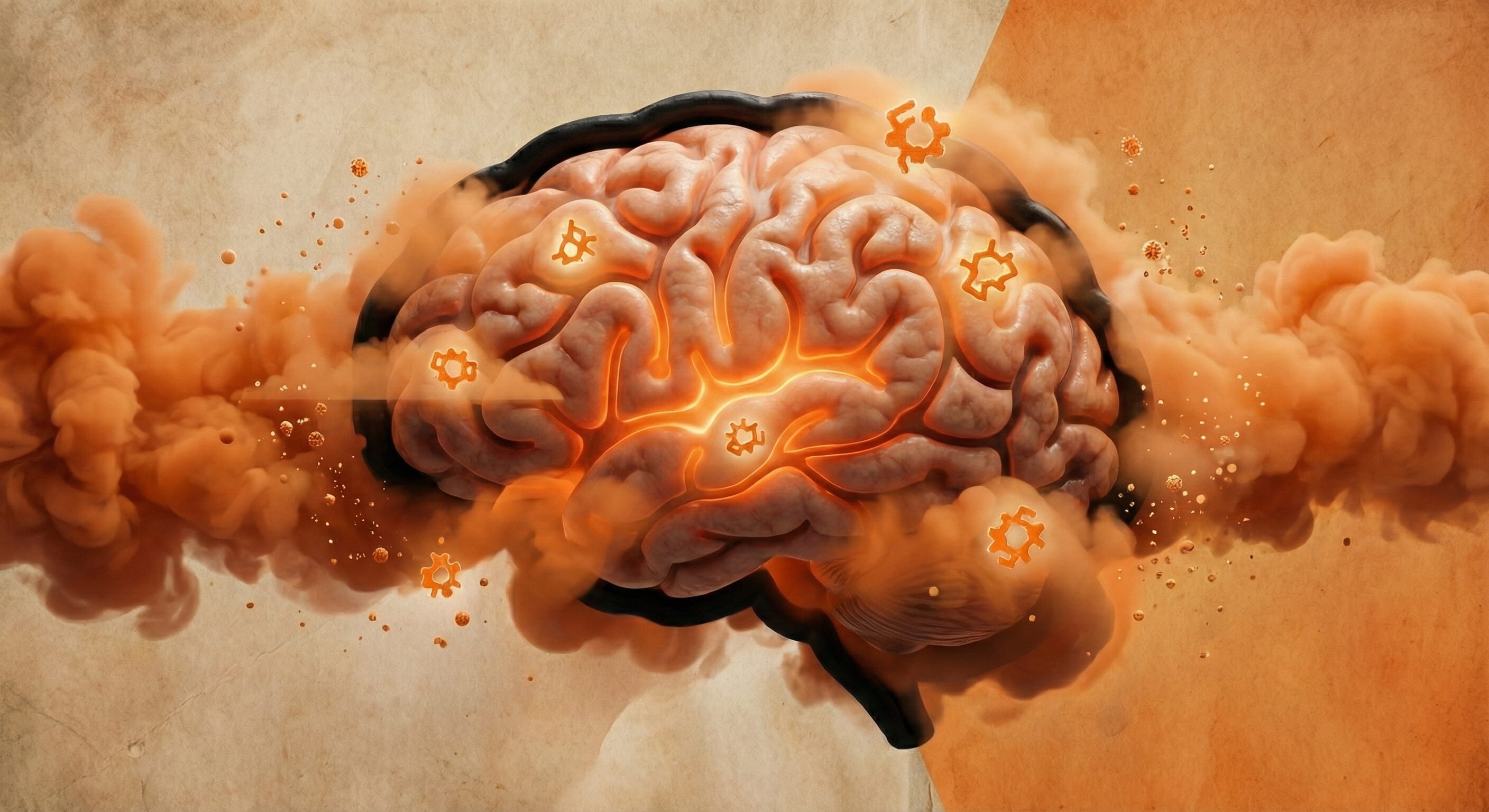Brain Fog

Brain fog is a term used to describe a set of symptoms affecting cognitive function, characterised by confusion, forgetfulness, and a lack of mental clarity and focus. It is not a medical diagnosis in itself but rather a sign that the body or brain is under stress due to lifestyle factors, medical conditions, or nutritional deficiencies. People experiencing brain fog often report feeling as though they are thinking through a thick haze or cotton wool, making everyday tasks and decision making more difficult than usual.
Common Symptoms and Experiences
The experience of brain fog varies from person to person, but it generally involves a noticeable decline in cognitive performance. If you are struggling with this, you might recognise the following signs:
- Memory lapses: Forgetting words mid sentence or struggling to recall recent events.
- Poor concentration: Finding it hard to focus on a single task or getting easily distracted.
- Mental fatigue: Feeling exhausted after simple mental efforts.
- Cloudy thinking: A general sense of confusion or slower processing speed.
Primary Causes and Triggers
Brain fog is usually multifactorial, meaning it stems from a combination of physical, emotional, and environmental factors. Identifying the root cause is the first step toward clearing the haze.
Chronic Stress and Sleep Deprivation
High levels of the stress hormone cortisol can disrupt the brain's ability to function optimally, while a lack of restorative sleep prevents the brain from clearing out toxins accumulated during the day. In the UK, surveys indicate that sleep disruption is a leading reported cause of cognitive fatigue among adults.
Hormonal Changes
Fluctuations in hormones such as oestrogen, progesterone, and testosterone significantly impact brain chemistry. This is frequently observed during:
- Menopause and Perimenopause: Many women report brain fog as a primary symptom due to dropping oestrogen levels [1].
- Thyroid Disorders: An underactive thyroid (hypothyroidism) slows down metabolism and cognitive processing.
- Pregnancy: Often colloquially referred to as "baby brain."
Nutritional Deficiencies
Your brain requires a constant supply of micronutrients to produce neurotransmitters and maintain energy. Deficiencies in Vitamin B12 [2], Vitamin D, and Iron (anemia) are common culprits behind mental sluggishness.
Viral Infections and Long COVID
Systemic inflammation caused by viral infections can affect the brain's neural pathways. According to data from the Office for National Statistics (ONS), brain fog is one of the most commonly reported symptoms of Long COVID [3], affecting a significant portion of those with lingering symptoms weeks or months after infection.
Brain Fog vs. Normal Fatigue
It can be difficult to distinguish between general tiredness and specific cognitive dysfunction. The table below outlines key differences to help you identify what you might be experiencing.
| Feature | General Fatigue | Brain Fog |
|---|---|---|
| Primary Feeling | Physical exhaustion, heavy limbs, desire to sleep. | Mental confusion, inability to focus, "spaced out." |
| Impact on Tasks | You can think clearly but lack the energy to act. | You have the energy but cannot organise your thoughts to act. |
| Response to Rest | Usually improves significantly after a good night's sleep. | May persist even after resting if the root cause (e.g., inflammation) is not addressed. |
Dietary Interventions to Improve Clarity
Nutrition plays a pivotal role in managing brain fog by regulating blood glucose levels and reducing inflammation. Large spikes and subsequent crashes in blood sugar can leave the brain starved of fuel, leading to immediate cognitive dips [5].
- Stabilise Blood Sugar: Focus on complex carbohydrates (oats, whole grains) paired with protein and healthy fats to prevent energy crashes.
- Hydration: Even mild dehydration (as little as 2% loss of body water) can impair cognitive performance and attention span [4].
- Omega 3 Fatty Acids: Found in oily fish like salmon and mackerel, these fats are essential for maintaining the structure of brain cells.
- Antioxidants: Foods rich in antioxidants, such as berries and leafy greens, help combat oxidative stress in the brain.
Nutritionist's Corner: Final Thoughts
"Brain fog is often the body's way of signalling that its battery is running low or its fuel mix is incorrect. While it can be frustrating, it is highly responsive to nutritional changes. I often advise clients to start with the basics: hydration and blood sugar balance. Ensure you are drinking enough water throughout the day and avoid skipping meals, which forces your brain to run on stress hormones. Incorporating anti inflammatory foods like turmeric, walnuts, and oily fish can also help clear the neural pathways and restore mental sharpness over time."
— Yusra Serdaroglu Aydin, MSc RD
Sources
- [1] Conde DM, Verdade RC, Valadares ALR, Mella LFB, Pedro AO, Costa-Paiva L. Menopause and cognitive impairment: A narrative review of current knowledge. World J Psychiatry. 2021 Aug 19;11(8):412-428. doi: 10.5498/wjp.v11.i8.412. PMID: 34513605; PMCID: PMC8394691.
- [2] Milind Umekar, Tanvi Premchandani, Amol Tatode, Mohammad Qutub, Neha Raut, Jayshree Taksande, Ujban Md. Hussain, Vitamin B12 deficiency and cognitive impairment: A comprehensive review of neurological impact, Brain Disorders, Volume 18, 2025, 100220, ISSN 2666-4593, https://doi.org/10.1016/j.dscb.2025.100220.
- [3] Miller A, Song N, Sivan M, et alExploring the experiences of cognitive symptoms in Long COVID: a mixed-methods study in the UKBMJ Open 2025;15:e084999. doi: 10.1136/bmjopen-2024-084999
- [4] Ganio MS, Armstrong LE, Casa DJ, McDermott BP, Lee EC, Yamamoto LM, Marzano S, Lopez RM, Jimenez L, Le Bellego L, Chevillotte E, Lieberman HR. Mild dehydration impairs cognitive performance and mood of men. Br J Nutr. 2011 Nov;106(10):1535-43. doi: 10.1017/S0007114511002005. Epub 2011 Jun 7. PMID: 21736786.
- [5] Weinstein G, Maillard P, Himali JJ, Beiser AS, Au R, Wolf PA, Seshadri S, DeCarli C. Glucose indices are associated with cognitive and structural brain measures in young adults. Neurology. 2015 Jun 9;84(23):2329-37. doi: 10.1212/WNL.0000000000001655. Epub 2015 May 6. PMID: 25948725; PMCID: PMC4464744.
Author

Yusra Serdaroglu Aydin, MSc RD
Head of Nutrition and Registered Dietitian
Yusra is a registered dietitian with a multidisciplinary background in nutrition, food engineering, and culinary arts. During her education, her curio...